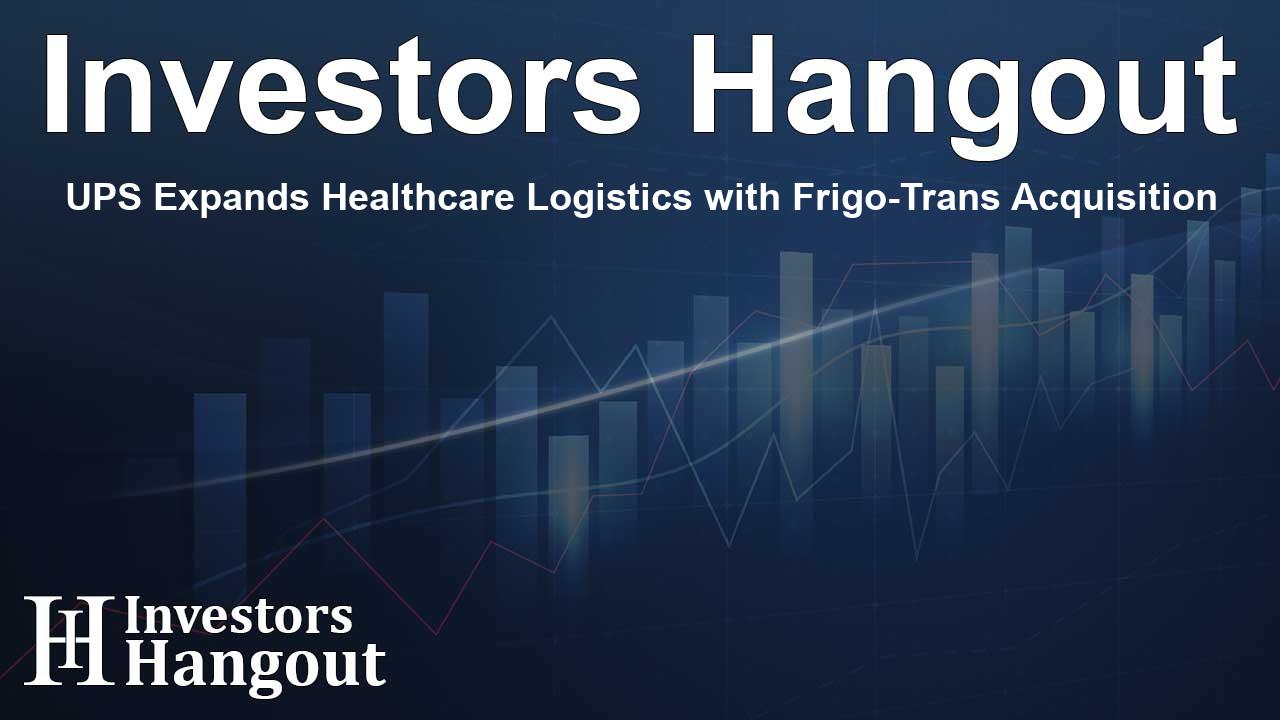UPS Expands Healthcare Logistics with Frigo-Trans Acquisition

UPS Expands Healthcare Logistics with Frigo-Trans Acquisition
UPS has made a significant move by announcing its acquisition of the Germany-based healthcare logistics firm Frigo-Trans. This strategic buy aims to enhance UPS's healthcare cold-chain facilities across Europe, thereby improving its service offerings in the vital sector of medical logistics.
Enhancing Cold-Chain Capabilities
Frigo-Trans boasts a comprehensive network that includes specialized temperature-controlled warehousing and freight forwarding services. This means UPS is not just acquiring a company but gaining access to a well-established pan-European cold chain transportation solution. Such capabilities are increasingly important as the demand for efficient and reliable healthcare logistics continues to rise.
About the Acquisition
As part of this acquisition, UPS is also set to purchase Frigo-Trans' sister company, BPL. By integrating these firms, UPS intends to fortify its existing logistics infrastructure while ensuring that healthcare providers have the necessary resources to manage sensitive shipments. The transaction is expected to close in the first quarter of 2025, marking a new chapter for UPS in the healthcare logistics industry.
Strategic Importance of Healthcare Logistics
The relevance of healthcare logistics has never been more pronounced, especially in the wake of global health crises. Consequently, companies like UPS are investing heavily in improving their logistics solutions. This acquisition is a clear indication of UPS's ambition to be a leader in the healthcare logistics landscape.
Future Prospects
Looking ahead, this acquisition will likely create new opportunities for UPS in the rapidly growing healthcare sector. The enhanced operational capacity provided by Frigo-Trans's infrastructure will empower UPS to cater to increasing demands, thereby potentially increasing market share in the European logistics realm.
Conclusion
This acquisition not only demonstrates UPS's commitment to enhancing its service offerings but also positions the company favorably amidst rising competition in healthcare logistics. As UPS moves forward, the integration of Frigo-Trans's robust systems will be instrumental in achieving its strategic objectives.
Frequently Asked Questions
What does the UPS acquisition of Frigo-Trans involve?
UPS will acquire Frigo-Trans to enhance its healthcare logistics capabilities in Europe, including temperature-controlled services.
When is the transaction expected to finalize?
The transaction is anticipated to close in the first quarter of 2025.
Why is healthcare logistics important?
Healthcare logistics is crucial for timely and safe delivery of medical supplies, especially considering the growing need for temperature-sensitive goods.
What additional company is UPS acquiring with Frigo-Trans?
UPS is also acquiring Frigo-Trans's sister company, BPL, as part of this deal.
How does this acquisition affect UPS's market position?
This acquisition strengthens UPS's presence in the healthcare sector, helping to meet increased demand for advanced logistics services.
About Investors Hangout
Investors Hangout is a leading online stock forum for financial discussion and learning, offering a wide range of free tools and resources. It draws in traders of all levels, who exchange market knowledge, investigate trading tactics, and keep an eye on industry developments in real time. Featuring financial articles, stock message boards, quotes, charts, company profiles, and live news updates. Through cooperative learning and a wealth of informational resources, it helps users from novices creating their first portfolios to experts honing their techniques. Join Investors Hangout today: https://investorshangout.com/
Disclaimer: The content of this article is solely for general informational purposes only; it does not represent legal, financial, or investment advice. Investors Hangout does not offer financial advice; the author is not a licensed financial advisor. Consult a qualified advisor before making any financial or investment decisions based on this article. The author's interpretation of publicly available data shapes the opinions presented here; as a result, they should not be taken as advice to purchase, sell, or hold any securities mentioned or any other investments. The author does not guarantee the accuracy, completeness, or timeliness of any material, providing it "as is." Information and market conditions may change; past performance is not indicative of future outcomes. If any of the material offered here is inaccurate, please contact us for corrections.